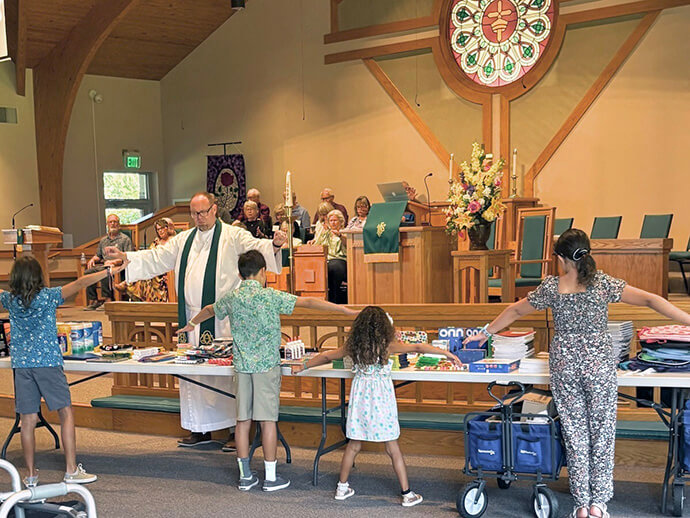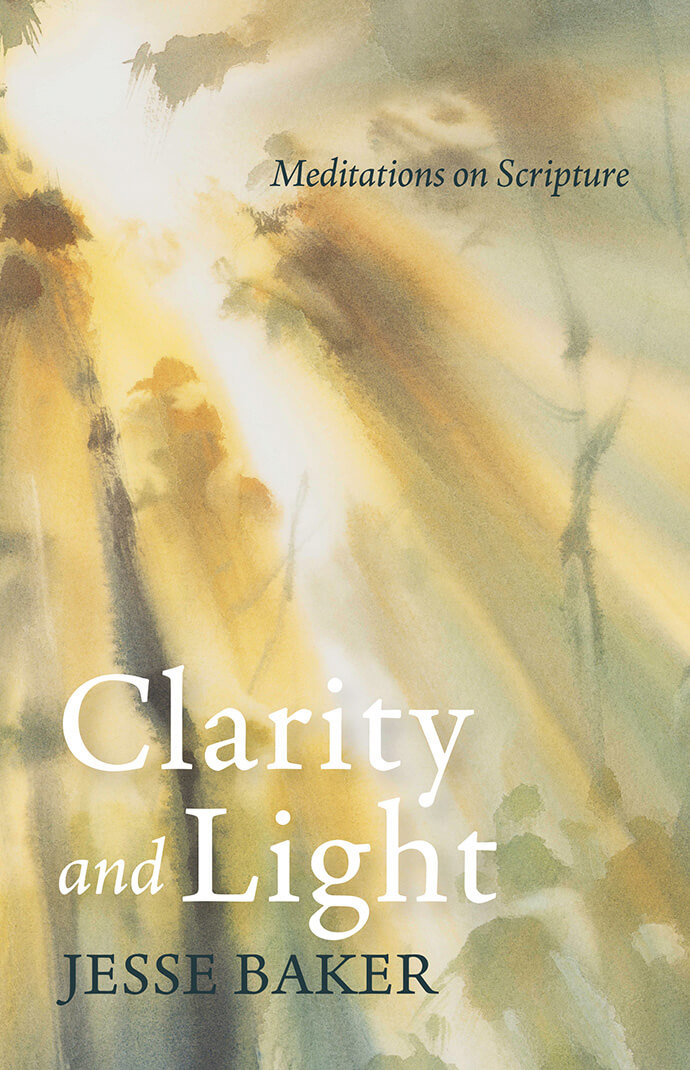Key points:
- The Rev. Jesse Baker is a poet who uses his interest in the arts to help him write better sermons.
- Baker writes a sonnet based on the Scripture he intends to preach on each week, then uses the sonnet to inspire his sermon.
- Baker has published a book of his sonnets, “Clarity and Light.”
He had the education and the passion, but the Rev. Jesse Baker still felt his sermons were falling flat.
Baker had good excuses, if he chose to see it that way. He was at his fifth church in four years, part of the aftershocks of pastoring a church that disaffiliated, leaving everyone feeling bruised and needing to regroup.
Baker, now the pastor of First United Methodist Church of Elon, North Carolina, found the answer to his sermon quandary in another of his passions: poetry. Not just any poetry, but a very particular type, that of the sonnet.
His technique these days is to take the Scripture on which he plans to preach and write a sonnet about it. Then the sonnet informs his sermon.
Writing a sonnet is no easy thing, if you remember from high school English. It must have 14 lines, be written in iambic pentameter, with each line having 10 syllables. There is a formula for which syllables are emphasized, and a specific rhyme scheme depending on what kind of sonnet you are writing.
Subscribe to our
e-newsletter
If this sounds like a complicated and time-consuming interim step to getting a sermon written, well, it probably would be for most. But it helps Baker get to the heart of the message he’s seeking to impart.
“He’s taken that Scripture passage and he isn’t giving it to you word for word, but he’s setting the scene,” said Vicki Ambrose, a certified lay minister at First United Methodist.
“He’s almost like a movie producer. He’s fleshing it out. He’s making it something you can identify with.”
For instance, Luke 2:7: “And she gave birth to her firstborn son and wrapped him in bands of cloth, and laid him in a manger, because there was no place for them in the inn.”
The passage inspired Baker to write the sonnet “Wonder.”
Did Mary feel frustration when she learned
She had to travel? Or, perhaps a sense
Of sadness that the simple acts of nesting
Were made impossible since she, herself,
Had been un-nested? Did she whisper prayers
In rhythm with their steady pace, begging
Birth pangs delay until arriving at
More pleasant dwellings? Did her heart sink down
When hearing she would have to sleep low in
The cellar stable? Did her fear spiral
With animals bleating, braying to match
Her birthing screams? And as the child was laid
Upon her chest, was all that came before
Forgotten when she held — beheld — new life?

A good deal of the Bible is itself poetry, said Brent Strawn, a professor of the Old Testament at Duke Divinity School, one of the 13 United Methodist schools of theology in the U.S.
“To be good readers of Scripture, we have to eventually learn how to have some level of comfort with poetry,” Strawn said. “It has been in disuse. … “I think that the sonnet form could open up new avenues of thinking about the text in terms of saying more by saying less, by attending to the mystery of the biblical text and also the power of language.”
Baker’s exercise of focusing on the message of Scripture and attempting to capture that message in poetic form, “requires a kind of discipline and habit of attention and gift of language that perhaps more preachers could benefit from,” Strawn said.

The Rev. Jesse Baker’s book, “Clarity and Light: Meditations on Scripture,” can be purchased at WIPF and Stock Publishers. Book cover courtesy of Resource Publications.
It is not Baker’s intention to change the meaning of Scripture, he said. But he is aiming to bring out a more universal truth than that derived by those who treat the Bible as a history book.
“Truth, in the Hebrew sense, is something that is trustworthy, something that will get you where it says it will,” Baker said. “I think the poetic mindset is something that actually gets you on that path a little bit more quickly and can help a reader see with even greater clarity. … It unlocks a different avenue of understanding and access to truth.”
Because he writes a sonnet a week (when he is preaching), Baker has accumulated enough to publish a book of his work, “Clarity and Light: Meditations on Scripture.” It was published in May by Resource Publications.
“(It) keeps me in a good habit of writing,” he said. “The sermon prep process was kind of a two-birds-one-stone thing that helped me to have subject matter to focus on, and help me have a regular routine and time frame in which to write.”
Baker’s methods haven’t produced a stampede of members of First United Methodist Church becoming poets, but his efforts have been acknowledged.
“I’ve gotten feedback that (people can tell) there’s been time spent wrestling with the text,” he said. “I’m appreciative of that, because that is one thing that I take very seriously, and they’re noticing.”
Lay minister Ambrose agrees.
The sonnets have “opened our eyes to see that there is a use to them, there is a purpose to them, and they can be an interesting tool,” she said.
Patterson is a UM News reporter in Nashville, Tennessee. Contact him at 615-742-5470 or newsdesk@umcom.org. To read more United Methodist news, subscribe to the free Daily or Weekly Digests.



